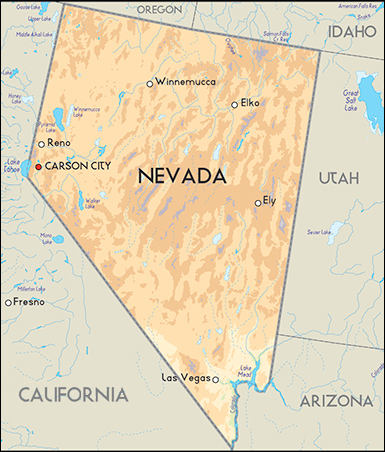By Jim Ellis
 Oct. 11, 2018 — The new NBC News/Marist College survey (Sept. 30-Oct. 3; 920 NV residents; 780 registered Nevada voters; 574 likely Nevada voters) detects movement toward the Republicans in the two major Nevada statewide races (governor and senator), while keeping both contests in the pure toss-up column.
Oct. 11, 2018 — The new NBC News/Marist College survey (Sept. 30-Oct. 3; 920 NV residents; 780 registered Nevada voters; 574 likely Nevada voters) detects movement toward the Republicans in the two major Nevada statewide races (governor and senator), while keeping both contests in the pure toss-up column.
Marist College is an “A” rated pollster from the 538 statistical analysis organization and has partnered with NBC News since the 2012 election. Already releasing several statewide polls this year, Marist tested the Nevada electorate knowing that Sen. Dean Heller (R) is embroiled in a tough re-election campaign against freshman Rep. Jacky Rosen (D-Henderson), while the open governor’s race, featuring Attorney General Adam Laxalt (R) and Clark County Commissioner Steve Sisolak (D), had begun to turn toward the latter.
According to the NBC/Marist ballot test results, Sen. Heller posts a 46-44 percent edge among likely voters and an almost identical 45-43 percent within the registered voter sample. When the Libertarian Party nominee is added and a question asking whether any of the candidates are satisfactory, Sen. Heller maintains the lead, 44-42 percent, with eight percent going to Libertarian Tim Hagan, and another two percent saying they want “none of these candidates.” Among registered voters, the respondents split 42-41-8-3 percent in Sen. Heller’s slight favor, with Rep. Rosen closely following, and Hagan and “none of the above” trailing respectively.
The results are not particularly surprising since this race has been close for months with neither candidate gaining enough traction beyond the polling margin of error at any point in time. Only 13 percent of likely voters and 16 percent of those registered say they are open to changing their mind. Therefore, it becomes unlikely that either major party candidate will be able to pull away from the other.
But, it is the governor’s race that is the more interesting campaign in this poll. AG Laxalt, who refuses to back Gov. Brian Sandoval’s (R) tax legacy plan that included a large levy increase but did not institute a state income tax, has not earned the support of the man he hopes to succeed even though the state chief executive is out front in a significant way backing Sen. Heller. Considering Gov. Sandoval’s strong popularity in the state, the endorsement controversy is certainly viewed as a major negative for the Republican nominee, but it appears Laxalt is overcoming this obstacle.
The NBC/Marist survey finds Laxalt developing a four-point lead among likely voters. The pollsters project the Republican to be leading Sisolak, 44-40 percent, with Libertarian Jared Lord taking eight percent, and “none of the above” registering two percent. When looking at the registered voter segment, the Laxalt lead diminishes to 41-40-8-2 percent. If this were a head-to-head race, Laxalt would post a bare 46-45 percent lead over Sisolak among likely voters but would trail 45-44 percent within the registered voter segment.
Interestingly, Republicans fare well on the generic question regarding party control of the US House of Representatives. Among likely voters the GOP actually leads the generic, 48-47 percent; within the registered voter segment, Democrats claim a 47-46 percent slight edge. But, on the question of whether or not the respondent would be more inclined to support or oppose a candidate who backed US Supreme Court nominee Judge Brett Kavanaugh, the likely voters split 38:41 percent among likely voters – meaning those opposing Kavanaugh have the higher number – and 34:39 percent among the registered voters.
President Trump’s standing within the Nevada electorate is improving despite losing the state to Hillary Clinton in the 2016 national campaign, 48-45 percent. The president’s job approval among likely voters is 45:47 percent, and 43:47 percent within the registered sector.
The Nevada Senate and governor’s race are closing in recent days, and we may be seeing a tipping point develop as we enter the last month of the campaign. As has been the case since the beginning of this election cycle, the Nevada race is one of the nation’s most important in determining which party will control the US Senate in the succeeding Congress.
